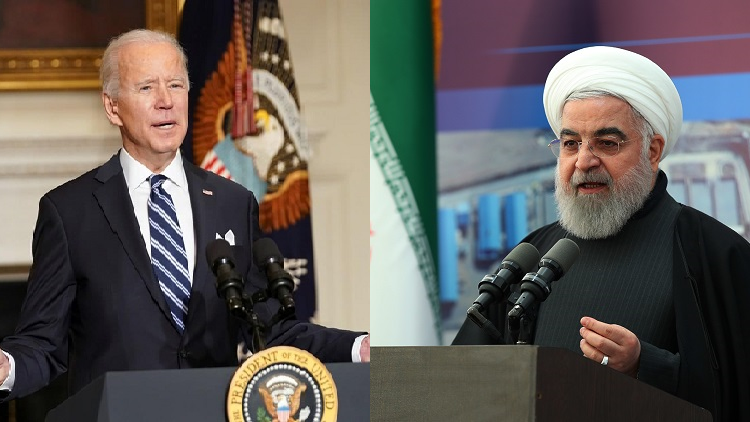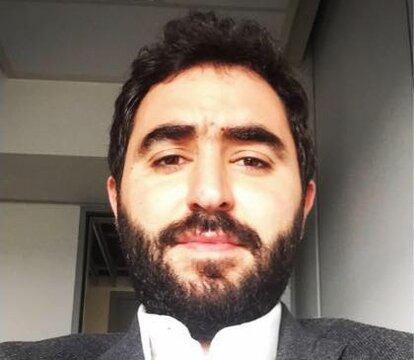MENAPOL Blog
Biden, a Nuclear Deal and Iran's Presidential Elections

With President Joseph Biden assuming office in the United States, the debate in Washington, Europe and the Middle East has shifted in terms of the “Iranian dossier.” It is clear that the Biden administration is keen to engage Iran on the nuclear file and aims to reach an agreement. His recent appointment of Robert Malley as the new administration’s Iran envoy and Wendy Ruth Sherman as deputy secretary of state meant to send positive signals towards Tehran and move the “Iranian dossier” forward.
The remaining question today surrounds the scope and detail of a new diplomatic accord between Washington and Tehran. Biden understands that whatever decision he takes regarding Tehran will not only shape US foreign policy towards the Middle East and North Africa region, but it will dictate US-MENA relations throughout his 4-year term. This attests to how delicate the situation is between reigning in Tehran by incentivizing it to conform to a deal — a tenant of Iran diplomacy Biden and his team seem to carry from the Obama administration days – and curtailing Iran’s nuclear capabilities and regional interference, a measure U.S. allies need satisfied.
Biden today is dealing with a region that has fundamentally changed since the tenure of former President Barak Obama and July 2015, when the JCPOA—Joint Comprehensive Plan of Action – was announced in an early morning appearance at the White House, that was even broadcasted live in Tehran. While the Obama administration previously held close to “secretive talks” to reach the deal (something that angered Israel and Washington’s longtime allies in the Gulf), Biden’s administration does not enjoy such luxury, with the entire world watching – and perhaps meddling — in anticipation.
This is specifically true for Israel which emerges today not only as a standalone regional power, but a leading actor empowered by normalization accords with 4 major Arab countries thus far — the United Arab Emirates, Bahrain, Sudan and Morocco — while also engaging secretly in talks with Saudi Arabia.
The new architecture in the Middle East, courtesy of former President Donald Trump and his son-in-law, will not simply have the ability to withstand pressure from the US and Europe while they pursue what they see as their own interests, but also has enough clout to alter policy calculations.
Amid a nationwide response to the COVID-19 pandemic and pressing challenges on the economic level which clearly represent the administration’s top priority, Biden is unlikely to deal with the renegotiations of a “a new comprehensive deal” with Tehran with urgency. Aside from the pressing domestic challenges Biden faces, his administration enjoys “maximum leverage” underpinned by the previous administration’s “maximum pressure policy,” enabling it to push in whatever direction it finds suitable.
As such, DC’s fresh narrative, reflected by two of President Biden’s top national security appointments, Antony Blinken, secretary of state and Avril Haines, director of national intelligence, argue for a "longer and stronger agreement” with Tehran while working with US allies.
Washington is adamant on testing Tehran’s will by pressing it on the resumption of compliance with the clause of the 2015 agreement, especially in terms of uranium enrichment, which Biden promises to be met by a relief from economic sanctions.
While Biden’s longer-term goal is a deal that stops Iran’s quest to acquire a nuclear weapon and also limits its missile program and support for regional sectarian proxies, reaching such a comprehensive deal with Tehran will not be an easy feat, especially in an election year in Iran. Well aware of that, the Biden administration will attempt to scale up “Iran’s nuclear” threat in order to justify a number of “steps of compromise” it will take towards Tehran, claim a victory in foreign policy and avoid back lash from regional allies and the Republicans. It seems that Jake Sullivan, President Biden’s new national security adviser, is tasked with that. A couple of days ago, Sullivan made that clear by saying, “[W]e are going to have to address Iran’s other bad behavior, malign behavior, across the region, but from our perspective, a critical early priority has to be to deal with what is an escalating nuclear crisis as they move closer and closer to having enough fissile material for a weapon.”
For the Iranians, Foreign Minister Javad Zarif is leading an aggressive drive to bring the US back to the negotiating table. However, this exposes two realities: (i) despite Iranian denials, Trump’s policies inflicted much damage on the regime and (ii) Tehran is in an incredibly weak position ahead of negotiations.
However, Tehran is attempting to outmaneuver the situation by overplaying its hand and raising the stakes on two levels. First, ideologically driven hardliners who control the parliament are not interested in a deal with the US and are making their position publicly known. The Iranian parliament recently passed a law dubbed a “strategic action plan to counter US sanctions,” which requires the government to resume 20% uranium enrichment and increase stockpiles of low-enriched uranium. The new law, which was approved by the Guardian Council, also calls for an end to the implementation of the Additional Protocol, a voluntary agreement on nuclear enrichment between the International Atomic Energy Agency and signatories of the nuclear Non-Proliferation Treaty. Parliament also introduced legislation that would obligate the government to initiate steps for the “destruction” of Israel by 2040; even if hollow rhetoric, it still irks the pro-Israel camp in the US and reflects the hardliners intent on disruption.
These parliamentary actions highlight the complex domestic dynamics of Iranian politics ahead of presidential elections set to take place in June. While reformists, represented by Zarif and President Hassan Rouhani, cling to their argument that the nuclear deal represents the country’s most promising path forward, hardliners spearheaded in parliament by the Speaker, Mohammad Bagher Ghalibaf — a representative of the Iranian Revolutionary Guards Corps, are adamant about hindering the process for Zarif to renegotiate in an election year. However, Zarif is using internal pressure from hardliners to his camp’s advantage. He is sending warning signals to the West that argues, if an unconditional return to the JCPOA is not achieved, the elections could be swept by hardliners – making a renewed JCPOA of any form harder to achieve. This duality has often served Tehran and despite its complexity, has allowed it to leverage situations into the benefit of the regime which the Ayatollah Khamenei sits on top of and works its differences.
However, the swift increase of security incidents in the region from Yemen to Iraq and Lebanon—countries that fall under the Iranian regime’s dominance as per the publicly expressed words of its own officials—also aims to heighten tension in the region while increasing pressure on the new administration to engage Iran in order to ease the situation. Tehran is well aware that with Biden’s administration, it does not have to fear harsh “punitive retaliation” by the US as it did under Trump.
As the nuclear negotiations become a central component of the forthcoming presidential elections in Tehran, so too is the state of the Iranian economy. Tehran is battling crippling US sanctions and a raging pandemic that is choking its domestic economy. Low oil prices are also impacting the country’s budget, with US sanctions forcing the Iranians to sell their oil at an even lower price on the black market. Millions have been pushed into extreme poverty over the past year. Recent reports by the committee of the Islamic Labour Council, cited by the Financial Times, suggest more than 60% of Iranians live in relative poverty. The number of those who struggle with extreme poverty has increased fivefold in the three years since the US quit the JCPOA and re-imposed sanctions. The official annual inflation rate is now 46.2%, compared to less than 10% in May 2018. Meanwhile, the Iranian Currency “Rial” reached its weakest-recorded value — 323,000 Rial against one US Dollar—in October, and as of Dececmber 2020, it depreciated 49% against the dollar.
Widespread poverty can very well yield political consequences. If the regime does not find solutions to the dire social and economic situation, it will face political and social instability as the world slowly emerges from the pandemic, at an even larger scale than the November 2019 protests it violently crushed. At the time, protests erupted across Iran after a multipronged decision by authorities to hike petrol prices, roll out rationing schemes and slash subsidies as part of efforts to blunt the effects of US sanctions on the country’s economy.
Nevertheless, unsanctioned Iranian oil is not expected to come back online in the next couple of months, but Iran may want to test the waters with a new administration by incrementally increasing exports and challenging Biden’s resolve. In fact, President Rouhani instructed the oil sector to begin preparations to revive oil and condensate exports, which are far less than what it exported in 2018 before Trump snapped out of the deal. While raising exports to over 2mn bpd in the next couple of months is a bit farfetched, Iran also faces new challenges in regaining its market share due to current market dynamics. Hence, it won’t be swiftly ramping up production after a 2-year shutdown.
Western oil majors have not shown signs of returning anytime soon to invest and develop Iran’s oil and gas resources, something Tehran had banked on while signing the deal. Multinationals like Shell and Total, which had previously been active in the Iranian gas sector, appear to have moved on for now, especially that new investment opportunities exist in Libya and elsewhere.
With few months left for President Rouhani and possibly for Javad Zarif in office, Biden should withstand Iranian and European pressure to fully reengage Tehran and concede prized leverage. If in the meantime, Tehran aims to pursue a nuclear weapon as it is claiming, then the international community, as a whole, might want to reconsider its approach towards the regime in Tehran. Also, dealing with a parting administration has its downside especially that the Presidential election in June might result in a complete takeover by the regime’s hardliners—more accurately, the IRGC—who garner way more animosity towards what they perceive as “the west.” And even in that case, the regime’s economic situation will still push to engage in talks to ease pressure and avoid possible unrest. At the end of the day, the nuclear talks never come to a complete pause even throughout the Ahmadinejad years, as Iranian writer Arash Azizi points out in his book “The Shadow Commander: Soleimani, the US, And Iran’s Global Ambitions.”
Lastly, President Biden’s conundrum oscillates between the US wanting to contain the Iranian threat in the region while it breaks from an Obama legacy deal, i.e. ensuring the interests and security of it regional allies, while also working towards reestablishing the US’ role as a defender of human rights principles, all while tension in the region, from Tel Aviv to Baghdad, Sanaa to Riyadh, builds up.
About the Author

